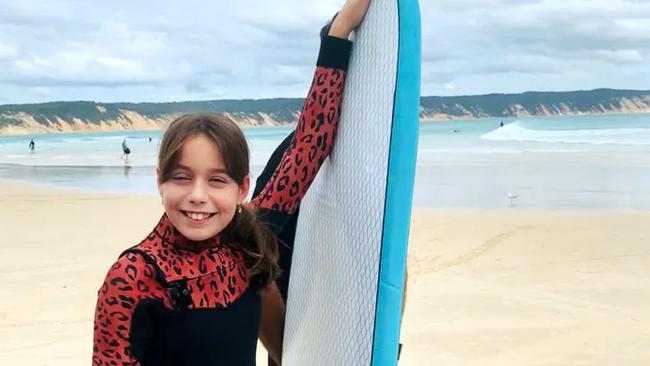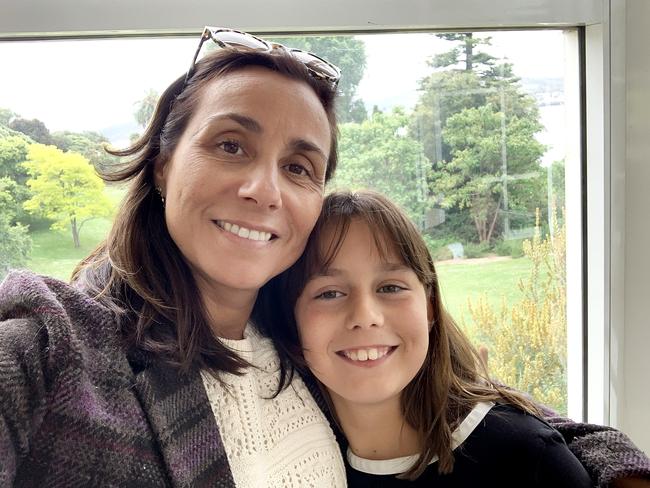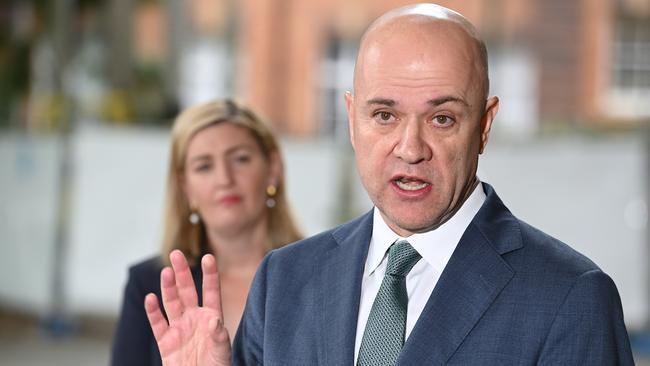Noosa schoolgirl second Australian flu fatality in days
The influenza B death of an 11-year-old Noosa schoolgirl will be investigated by the coroner, the Health Minister has confirmed.

QLD News
Don't miss out on the headlines from QLD News. Followed categories will be added to My News.
- Explained: Why flu is so deadly
- Sick kids: Urgent warning for schools
- ‘Torn apart’: Heartbreaking death
The flu-related death of 11-year-old Queenslander Emma Schwab will be investigated by the coroner Health Minister Shannon Fentiman says, as she again pleaded for people to get vaccinated.
The little girl died with the flu a day after she was released from a private hospital’s emergency department.
It is understood Emma Schwab was taken to the Noosa Hospital emergency department on July 5 after contracting influenza B, but the following day she was back at her home where an ambulance had to be called.
Emma was said to have been extremely unwell when it is understood several crews arrived, including critical care paramedics, and she was rushed to the Sunshine Coast University Hospital.
But she tragically died soon after arriving, plunging her parents Cameron and Javiera Schwab into grief.

Speaking from Cairns on Thursday, Ms Fentiman defended Emma’s family’s right to pursue legal avenues if they weren’t happy with the standard of care they received, but said the case would be thoroughly examined by the coroner.
“I think that’s really important because the coroner can look at the system as a whole,” she said.
“The coroner is best placed to look at all of those instances where she presented to either a GP or the private hospital and then transferred to the state hospital.”
She also called on Queenslanders to get vaccinated for the flu and said there was a “huge supply” of jabs available at GPs and pharmacies.
“I’ve asked the chief health officer and the department to work on what more we can do to encourage people to get vaccinated,” Ms Fentiman said.
“Our vaccination rates are down, it is incredibly concerning.
“If you are not vaccinated, please get vaccinated, if your children are not vaccinated, it is free for children to be vaccinated for influenza.”
Deputy Premier Steven Miles earlier on Thursday described Emma’s death as a “tragedy”.
“It underlines how dangerous the flu is, and just how important it is that everyone gets their vaccinations,” he said.
“It also underlines just how much pressure the flu season puts on our hospitals and our health care workers, and I know they do their very best to take care of Queenslanders.”
Pressed on whether he was concerned about reports the girl had been sent home from hospital, Dr Miles said there was only “so much he could comment about individual cases”, due to privacy.
“Everything I’ve heard about the story is absolutely tragic, as a parent with children around that age – it’s just awful” he said.
“It underlines how dangerous the flu is, I think we often don’t realise just how serious it can be.”

CHO’S STARK WARNING
Emma’s shock death comes as Queensland’s chief health officer John Gerrard reveals he is worried about the state’s children as school resumes, with influenza ripping through communities and leaving many kids seriously ill and hospitalised.
A high school student in NSW has also died in recent days after contracting influenza B.
A Sunshine Coast Hospital and Health spokeswoman offered her sincerest sympathies to Emma’s family.
“Their experience is heartbreaking ...” she said.
“Our clinicians are providing support to the family.”
She would not comment on the circumstances of Emma’s death.
A spokeswoman for Ramsay Health Care, operators of Noosa Hospital, said in a statement: “We express our deepest condolences to the patient’s family and loved ones; we have been in contact with the family to offer our support during this extremely difficult time.”
Queensland has the highest number of flu cases in the country at a rate of 722 cases per 100,000 people and cases have been highest in children aged five to nine, followed by those aged zero to four years and then ages 10 to 14 years.
In the past 12 days 78 children aged six months to four yearshave been hospitalised with flu – 50 with the B strain.
Only one was vaccinated.
Eleven infants under six months were hospitalised with flu, eight of whom had the B strain.
“We are very concerned about the increase in influenza B cases and the high rate of unvaccinated patients, particularly with school resuming this week,” Dr Gerrard said.
“Influenza B is causing severe illness in otherwise healthy Queenslanders, young people in particular.”
Queensland experienced an influenza A wave leading into winter, but influenza B has taken over as the dominant strain.
“There have been three times more hospital admissions for influenza B than influenza A in children aged less than five years,” Dr Gerrard said.
“Influenza B is known to be associated with more severe disease in children, many of whom would never have been exposed to influenza because of Covid-19 restrictions over the past three years.”

With Australia on track to eclipse its deadliest ever flu season in 2019, doctors are laying the blame squarely at the feet of poor vaccination rates.
Queensland’s 2023 flu toll stands at 47,300 case notifications, with 3814 hospital admissions and 31 ICU admissions.
At least 107 Australians have lost their lives to influenza since the start of the year, according to data from the Federal Department of Health.
However, a spokeswoman for the department warned the number did not reflect the true mortality of the disease as it would “require the specific follow up of each specific case to determine the outcome of their infection.-associated deaths have been notified to the National Notifiable Diseases Surveillance System”.
Dr Gerrard pleaded with every Queenslander who is yet to get a flu shot to do so now.
“If you or your children have not been vaccinated against flu, I urge you to please book in with your GP or pharmacist to do so,” he said.
“We don’t want any more Queenslanders to suffer the anguish of being hospitalised or the grief of losing a loved one.”
Mater Health infectious diseases director Associate Professor Paul Griffin said hospitals were seeing flu patients every day with some being transferred straight to the ICU.
He said while it was not unusual to see high rates of flu in children the concern this year was the extremely low vaccination rates of those under 18.
“I think people have lost sight of the significance of the flu,” he said.
“We obviously had two years, essentially, with no flu cases, and so much of a focus on Covid, and I think people have almost forgotten that the flu itself is a very significant infection, and that it does impact children quite significantly.
“And we’ve got a great vaccine, but the uptake is just nowhere near where it needs to be at the moment.”
Prof Griffin said it was clear the country was tracking at a similar trajectory to 2019 and “we certainly aren’t at the peak yet”.
“So one big piece of misinformation people often have about the flu and flu vaccines is that if you’ve had then you are covered, we do need people to know that if they’ve had the flu, it’s not too late to get vaccinated against other strains and get some protection for the remainder of the season,” he said.
Originally published as Noosa schoolgirl second Australian flu fatality in days


